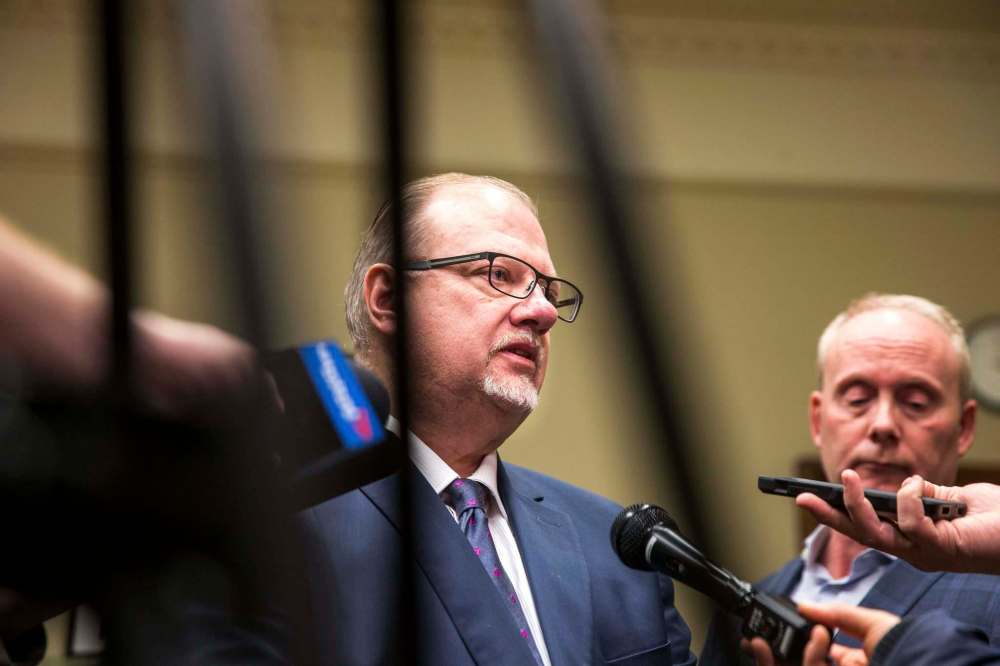Tories right to put squeeze on school boards
Read this article for free:
or
Already have an account? Log in here »
To continue reading, please subscribe:
Monthly Digital Subscription
$19 $0 for the first 4 weeks*
- Enjoy unlimited reading on winnipegfreepress.com
- Read the E-Edition, our digital replica newspaper
- Access News Break, our award-winning app
- Play interactive puzzles
*No charge for four weeks then billed as $19 plus GST every four weeks. Offer only available to new and qualified returning subscribers. Cancel any time.
Read unlimited articles for free today:
or
Already have an account? Log in here »
Hey there, time traveller!
This article was published 29/01/2020 (1794 days ago), so information in it may no longer be current.
There are two inescapable facts that work against school trustees who claim the Pallister government is starving the public education system of funds. One is that school divisions have more than doubled per student spending from 1999 to 2018 — about twice the rate of inflation. The other is that Manitoba has the third-highest per student spending among the provinces.
When you add in the fact that Manitoba students have ranked last, or close to last, in national testing for several years, trustees don’t have much of a leg to stand on.
On Thursday, the Pallister government announced funding levels for school divisions. As they have done since taking office in 2016, the Tories are limiting overall funding to school divisions to less than inflation. This year, it’s 0.5 per cent.
That means some divisions will get more than that, while others will get a cut, depending on factors such as enrolment and local tax assessments.

Unlike in past years under the former NDP government, a school board can’t just go to the property taxpayer to make up the difference between what it would like to spend and what the province gives it. For the third year in a row, there will be a two per cent cap on school property taxes in 2020.
The Pallister government is forcing school divisions to do what many people have demanded for years: control spending. Despite repeated claims by many trustees that they’ve done everything they can to find savings over the years (including staying below provincially mandated caps on administrative spending), overall operating spending has increased by twice the rate of inflation on a per student basis.
In the past 20 years, the number of school divisions has dropped by 17, a 31 per cent decline, yet the number of executive, managerial and supervisory positions has increased. Salary costs for this group have increased 86 per cent during that period, well above the inflation rate of 47 per cent.
Education Minister Kelvin Goertzen announced Thursday that school divisions will be subject to the same 15 per cent cut to senior management that central government and Crown corporations have been subject to in recent years. An independent analysis will be done to assess the ratio of managers to non-managers in school divisions. In a letter to school boards, Goertzen clarified that the province’s two-year wage freeze (followed by a 0.75 per cent and one per cent increase in the following two years), will apply to all areas of school divisions.
The Pallister government is forcing school divisions to do what many people have demanded for years: control spending.
To illustrate that divisions have plenty of discretionary spending to cut, the Pallister government released 10 pages of out-of-province travel expenses filed by managers and trustees in the past two years. It adds up to about $1 million. The junkets include trips to U.S. cities such as Las Vegas, San Antonio and Nashville for conferences and summits. One trustee in the Interlake spent $3,387 to attend a national arts conference in Seattle. Another travelled to Philadelphia for a national school boards conference at a cost of $3,400. An assistant superintendent from the Frontier School Division spent $3,102 to attend a K-12 Dell Canada Conference in Austin, Texas. There were trips to Kenya, Australia and Norway. Meanwhile, trustees continue to claim they’re strapped for cash.
The Pallister government is preparing divisions for further reforms that are expected to come out of the province’s K-12 commission report, which will be released in late March. That commission will, among other things, make recommendations on governance structures in the public school system, including the likelihood of school division amalgamations.
This is what happens after two decades of uncontrolled spending by school divisions, which in many cases included school property tax hikes of five, six and seven per cent. Eventually, the provincial government, or at least this one, is going to put an end to it through directives and legislation. Trustees may not like it. But taxpayers have had enough.
tom.brodbeck@freepress.mb.ca

Tom Brodbeck
Columnist
Tom has been covering Manitoba politics since the early 1990s and joined the Winnipeg Free Press news team in 2019.
Our newsroom depends on a growing audience of readers to power our journalism. If you are not a paid reader, please consider becoming a subscriber.
Our newsroom depends on its audience of readers to power our journalism. Thank you for your support.
History
Updated on Thursday, March 5, 2020 10:53 AM CST: fixes typo









